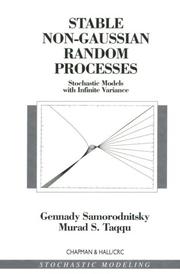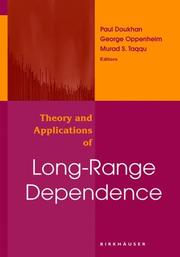| Listing 1 - 10 of 13 | << page >> |
Sort by
|
Book
ISBN: 3319623311 3319623303 Year: 2017 Publisher: Cham : Springer International Publishing : Imprint: Springer,
Abstract | Keywords | Export | Availability | Bookmark
 Loading...
Loading...Choose an application
- Reference Manager
- EndNote
- RefWorks (Direct export to RefWorks)
This book provides a self-contained presentation on the structure of a large class of stable processes, known as self-similar mixed moving averages. The authors present a way to describe and classify these processes by relating them to so-called deterministic flows. The first sections in the book review random variables, stochastic processes, and integrals, moving on to rigidity and flows, and finally ending with mixed moving averages and self-similarity. In-depth appendices are also included. This book is aimed at graduate students and researchers working in probability theory and statistics.
Mathematics. --- Dynamics. --- Ergodic theory. --- Probabilities. --- Probability Theory and Stochastic Processes. --- Dynamical Systems and Ergodic Theory. --- Gaussian processes. --- Math --- Science --- Distribution (Probability theory) --- Stochastic processes --- Distribution (Probability theory. --- Differentiable dynamical systems. --- Differential dynamical systems --- Dynamical systems, Differentiable --- Dynamics, Differentiable --- Differential equations --- Global analysis (Mathematics) --- Topological dynamics --- Distribution functions --- Frequency distribution --- Characteristic functions --- Probabilities --- Ergodic transformations --- Continuous groups --- Mathematical physics --- Measure theory --- Transformations (Mathematics) --- Dynamical systems --- Kinetics --- Mathematics --- Mechanics, Analytic --- Force and energy --- Mechanics --- Physics --- Statics --- Probability --- Statistical inference --- Combinations --- Chance --- Least squares --- Mathematical statistics --- Risk
Book
ISBN: 8847016789 8847056047 8847016797 Year: 2010 Publisher: New York : Springer,
Abstract | Keywords | Export | Availability | Bookmark
 Loading...
Loading...Choose an application
- Reference Manager
- EndNote
- RefWorks (Direct export to RefWorks)
The concept of Wiener chaos generalizes to an infinite-dimensional setting the properties of orthogonal polynomials associated with probability distributions on the real line. It plays a crucial role in modern probability theory, with applications ranging from Malliavin calculus to stochastic differential equations and from probabilistic approximations to mathematical finance. This book is concerned with combinatorial structures arising from the study of chaotic random variables related to infinitely divisible random measures. The combinatorial structures involved are those of partitions of finite sets, over which Möbius functions and related inversion formulae are defined. This combinatorial standpoint (which is originally due to Rota and Wallstrom) provides an ideal framework for diagrams, which are graphical devices used to compute moments and cumulants of random variables. Several applications are described, in particular, recent limit theorems for chaotic random variables. An Appendix presents a computer implementation in MATHEMATICA for many of the formulae.
Stochastic partial differential equations. --- Stochastic integrals. --- Gaussian processes. --- Integrals, Stochastic --- Banach spaces, Stochastic differential equations in --- Hilbert spaces, Stochastic differential equations in --- SPDE (Differential equations) --- Stochastic differential equations in Banach spaces --- Stochastic differential equations in Hilbert spaces --- Mathematics. --- Measure theory. --- Economics, Mathematical. --- Probabilities. --- Combinatorics. --- Probability Theory and Stochastic Processes. --- Quantitative Finance. --- Measure and Integration. --- Distribution (Probability theory) --- Stochastic processes --- Stochastic analysis --- Differential equations, Partial --- Distribution (Probability theory. --- Finance. --- Math --- Science --- Combinatorics --- Algebra --- Mathematical analysis --- Funding --- Funds --- Economics --- Currency question --- Distribution functions --- Frequency distribution --- Characteristic functions --- Probabilities --- Economics, Mathematical . --- Lebesgue measure --- Measurable sets --- Measure of a set --- Algebraic topology --- Integrals, Generalized --- Measure algebras --- Rings (Algebra) --- Mathematical economics --- Econometrics --- Mathematics --- Probability --- Statistical inference --- Combinations --- Chance --- Least squares --- Mathematical statistics --- Risk --- Methodology

ISBN: 0412051710 9780412051715 Year: 2000 Publisher: Boca Raton, Fla Chapman & Hall
Abstract | Keywords | Export | Availability | Bookmark
 Loading...
Loading...Choose an application
- Reference Manager
- EndNote
- RefWorks (Direct export to RefWorks)
Stochastic processes --- Gaussian distribution --- Gaussian processes --- Gauss, loi de (Statistique) --- Processus gaussiens --- 519.2 --- Normal distribution --- Distribution (Probability theory)
Book
ISBN: 110820614X 1108215599 1139600346 1107039460 Year: 2017 Publisher: Cambridge : Cambridge University Press,
Abstract | Keywords | Export | Availability | Bookmark
 Loading...
Loading...Choose an application
- Reference Manager
- EndNote
- RefWorks (Direct export to RefWorks)
This modern and comprehensive guide to long-range dependence and self-similarity starts with rigorous coverage of the basics, then moves on to cover more specialized, up-to-date topics central to current research. These topics concern, but are not limited to, physical models that give rise to long-range dependence and self-similarity; central and non-central limit theorems for long-range dependent series, and the limiting Hermite processes; fractional Brownian motion and its stochastic calculus; several celebrated decompositions of fractional Brownian motion; multidimensional models for long-range dependence and self-similarity; and maximum likelihood estimation methods for long-range dependent time series. Designed for graduate students and researchers, each chapter of the book is supplemented by numerous exercises, some designed to test the reader's understanding, while others invite the reader to consider some of the open research problems in the field today.
Self-similar processes. --- Time-series analysis. --- Gaussian processes. --- Distribution (Probability theory) --- Stochastic processes --- Analysis of time series --- Autocorrelation (Statistics) --- Harmonic analysis --- Mathematical statistics --- Probabilities --- Selfsimilar processes
Digital
ISBN: 9788847016798 Year: 2011 Publisher: Milano Springer Milan
Abstract | Keywords | Export | Availability | Bookmark
 Loading...
Loading...Choose an application
- Reference Manager
- EndNote
- RefWorks (Direct export to RefWorks)
Operational research. Game theory --- Discrete mathematics --- Mathematical physics --- differentiaalvergelijkingen --- chaos --- discrete wiskunde --- stochastische analyse --- kansrekening
Digital
ISBN: 9783319623313 Year: 2017 Publisher: Cham Springer International Publishing
Abstract | Keywords | Export | Availability | Bookmark
 Loading...
Loading...Choose an application
- Reference Manager
- EndNote
- RefWorks (Direct export to RefWorks)
This book provides a self-contained presentation on the structure of a large class of stable processes, known as self-similar mixed moving averages. The authors present a way to describe and classify these processes by relating them to so-called deterministic flows. The first sections in the book review random variables, stochastic processes, and integrals, moving on to rigidity and flows, and finally ending with mixed moving averages and self-similarity. In-depth appendices are also included. This book is aimed at graduate students and researchers working in probability theory and statistics.
Book
ISBN: 0817633235 Year: 1986 Publisher: Boston Birkhäuser
Abstract | Keywords | Export | Availability | Bookmark
 Loading...
Loading...Choose an application
- Reference Manager
- EndNote
- RefWorks (Direct export to RefWorks)

ISBN: 0817641688 Year: 2003 Publisher: Boston, Mass. Birkhäuser
Abstract | Keywords | Export | Availability | Bookmark
 Loading...
Loading...Choose an application
- Reference Manager
- EndNote
- RefWorks (Direct export to RefWorks)
Stochastic processes --- Mathematical statistics --- Brownian motion processes --- Time-series analysis --- 519.55 --- 519.21 --- 519.233.5 --- Wiener processes --- Brownian movements --- Fluctuations (Physics) --- Markov processes --- 519.233.5 Correlation analysis. Regression analysis --- Correlation analysis. Regression analysis --- 519.21 Probability theory. Stochastic processes --- Probability theory. Stochastic processes --- Analysis of time series --- Autocorrelation (Statistics) --- Harmonic analysis --- Probabilities
Book
ISBN: 3764334851 Year: 1991 Publisher: Boston Birkhäuser
Abstract | Keywords | Export | Availability | Bookmark
 Loading...
Loading...Choose an application
- Reference Manager
- EndNote
- RefWorks (Direct export to RefWorks)
Book
ISBN: 9788847016798 Year: 2011 Publisher: Milano Springer Milan
Abstract | Keywords | Export | Availability | Bookmark
 Loading...
Loading...Choose an application
- Reference Manager
- EndNote
- RefWorks (Direct export to RefWorks)
The concept of Wiener chaos generalizes to an infinite-dimensional setting the properties of orthogonal polynomials associated with probability distributions on the real line. It plays a crucial role in modern probability theory, with applications ranging from Malliavin calculus to stochastic differential equations and from probabilistic approximations to mathematical finance. This book is concerned with combinatorial structures arising from the study of chaotic random variables related to infinitely divisible random measures. The combinatorial structures involved are those of partitions of finite sets, over which Möbius functions and related inversion formulae are defined. This combinatorial standpoint (which is originally due to Rota and Wallstrom) provides an ideal framework for diagrams, which are graphical devices used to compute moments and cumulants of random variables. Several applications are described, in particular, recent limit theorems for chaotic random variables. An Appendix presents a computer implementation in MATHEMATICA for many of the formulae.
Operational research. Game theory --- Discrete mathematics --- Mathematical physics --- differentiaalvergelijkingen --- chaos --- discrete wiskunde --- stochastische analyse --- kansrekening
| Listing 1 - 10 of 13 | << page >> |
Sort by
|

 Search
Search Feedback
Feedback About UniCat
About UniCat  Help
Help News
News